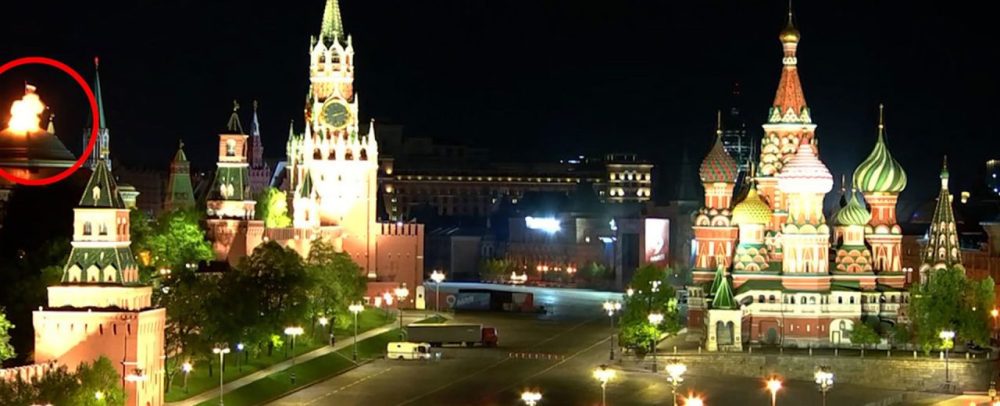Yoselina Guevara López
 The Russian presidential press service reported on Wednesday, May 3, that “the Kiev regime attempted to attack the Kremlin residence using two drones”, an action carried out on the night of May 2. The Russian authorities pointed out that “the drones were deactivated” by the security systems of the special forces, and added that “the fragments that fell in the area of the presidential residence did not cause any casualties or material damage”. There is no doubt that this attack, although failed, may cause a sudden change in the Russia-Ukraine conflict.
The Russian presidential press service reported on Wednesday, May 3, that “the Kiev regime attempted to attack the Kremlin residence using two drones”, an action carried out on the night of May 2. The Russian authorities pointed out that “the drones were deactivated” by the security systems of the special forces, and added that “the fragments that fell in the area of the presidential residence did not cause any casualties or material damage”. There is no doubt that this attack, although failed, may cause a sudden change in the Russia-Ukraine conflict.
Kiev in the eye of the hurricane
According to the official Russian information the drones used in the attack were immediately identified as Ukrainian, as they qualified the operation as “a planned terrorist act” and “an attempt on the life of President Vladimir Putin shortly before the Victory Day and the May 9 parade, which will be attended by important foreign guests”. However from Kiev they have officially denied their involvement in the night attack on the Kremlin and reiterated that “Ukraine’s actions are not aimed at attacking foreign territories”.
Evidently these statements are useless in the face of the track record that Kiev has been building up, and its incursions into Russian territory have been documented. For example, in December 2022, three Russian servicemen were killed when they shot down a Ukrainian drone aimed at attacking a military airfield in Saratov Oblast, Russian territory. But this is one of the many incursions of Ukrainian drones into the space of the Russian Federation. Likewise, the constant threats from Ukraine to take the war to Russian territory, the explosion of the Crimean Bridge, in addition to the terrorist attacks in which the journalists Darya Dugina and Vlanden Tatarsky lost their lives; by virtue of which there are many indications that point to the Kiev regime as the perpetrator of this assassination attempt.
Despite not feeling any sympathy for the Ukrainian authorities, it may be possible that in fact they knew absolutely nothing about the attack in Moscow. It is public knowledge that high-ranking NATO professionals operate in Kiev, as well as intelligence services of the United States and other nations, whose orders are executed by Ukrainians without the Kiev government being informed. It is therefore implausible that the Americans and Western intelligence services on the ground were unaware of the Kremlin’s attack operation. To this must be added the worldwide calls in public opinion for the physical elimination of President Putin by any means and at any price, even if this assassination attempt is still an amateur operation to say the least.
False Flag
Trying to be objective, we must point out that there is also the hypothesis of a false flag operation executed by the Kremlin, even going as far as internal conspiracy. Such an attack could be used to accelerate the outcome of the Russia-Ukraine conflict in order to finally strike directly at the Ukrainian government and the Ukrainian leadership. It is curious that President Putin was not in the Kremlin at the time of the attack; his press secretary, Dmitry Peskov, stated that he was not in the residence.
Escalation or Peace in the Russia-Ukraine Conflict
On the other hand, the importance of this military action against the Kremlin is that it could justify a symmetrical retaliation such as the application of war measures never taken by the Russian Armed Forces during these first fourteen months of the special military operation in Ukraine. That is, the generalized attack on the centers of political decision-making in Kiev: the presidential office, the palaces of the ministries, the Verkhovna Rada (unicameral parliament) and the headquarters of the Ukrainian intelligence services. But from another, more positive point of view, it could be a justification for the West to remove Zelensky from the game, for having violated the code of chivalry, thus creating more favorable conditions for the end of hostilities and the beginning of peace negotiations, of which even China has already taken firm steps in this direction. The chessboard is still open, we will see how the pieces move in the coming days.
Yoselina Guevara López: Venezuelan social communicator, political analyst, columnist in different international media, whose work has been translated into English, Italian, Greek and Swedish. Winner of the Simon Bolivar 2022 National Journalism Award (Venezuela), special mention Opinion; Anibal Nazoa 2021 National Journalism Award (Venezuela); I Comandante Feliciano 2022 Historical Memory Contest (El Salvador) Third place. Twitter: @lopez_yoselina #MundoTuit